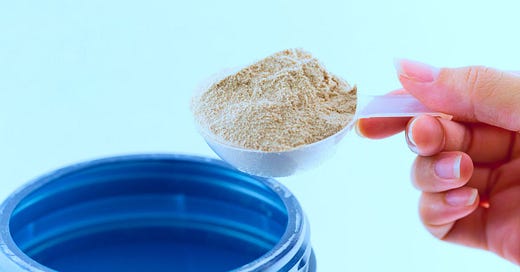100 Grams of Protein Post Workout Results in 'Greater and More Prolonged Anabolic Response' Compared Just 25 Grams: Journal 'Cell Reports Medicine'
Study shows "ingestion of 100 g protein results in a greater and more prolonged (>12 h) anabolic response when compared to the ingestion of 25 g protein."
A December study published in Cell Reports Medicine confirms that ingesting 100 grams of protein after a workout produces better results than ingesting just 25 grams.
Follow Jon Fleetwood on Instagram @realjonfleetwood / Twitter @JonMFleetwood
The study results contradict the long-held idea that the body’s muscle-building response after eating following exercise is temporary and has a maximum limit.
They also refute the notion that extra amino acids that are injected aren’t being burned for energy.
“The belief that the anabolic response to feeding during postexercise recovery is transient and has an upper limit and that excess amino acids are being oxidized lacks scientific proof,” the study reads.
“Using a comprehensive quadruple isotope tracer feeding-infusion approach, we show that the ingestion of 100 g protein results in a greater and more prolonged (>12 h) anabolic response when compared to the ingestion of 25 g protein.”
In fact, the study authors argue that there is no “upper limit” to the anabolic response to protein consumption: “Here, we show that the anabolic response to protein ingestion has no apparent upper limit in magnitude and duration in vivo in humans,” they write.
The new data provide valuable insight into the ongoing controversy over the impact of different muscle-optimizing diet strategies.
Follow Jon Fleetwood on Instagram @realjonfleetwood / Twitter @JonMFleetwood
It has been generally believed that the ingestion of only 20 grams of protein maximizes postprandial (after meal) muscle protein synthesis rates while at rest and during recovery from exercise in healthy, young adults, the study explains.
The new paper investigated the potential upper limits and/or sustained elevation of postprandial protein metabolism by providing the proposed optimal amount (25g) and the largest amount of protein the authors considered feasible to consume in a single meal (100g).
It evaluated postprandial protein handling throughout a prolonged 12-hour assessment period.
“We observed higher plasma, muscle, and whole-body protein synthesis rates following the ingestion of 100 g protein when compared to 25 g protein and placebo, respectively,” the authors confirm.
“The greater metabolic responses were present during the early postprandial phase (0–4 h) but were even more pronounced during the prolonged postprandial phase (4–12 h).”
The study proves that “even very large amounts of dietary protein are effectively utilized to support postprandial tissue anabolism.”
The study authors’ affiliations include:
Department of Human Biology, NUTRIM School of Nutrition and Translational Research in Metabolism, Maastricht University Medical Centre+, Maastricht, the Netherlands
You can download the full study below:
Follow Jon Fleetwood on Instagram @realjonfleetwood / Twitter @JonMFleetwood




